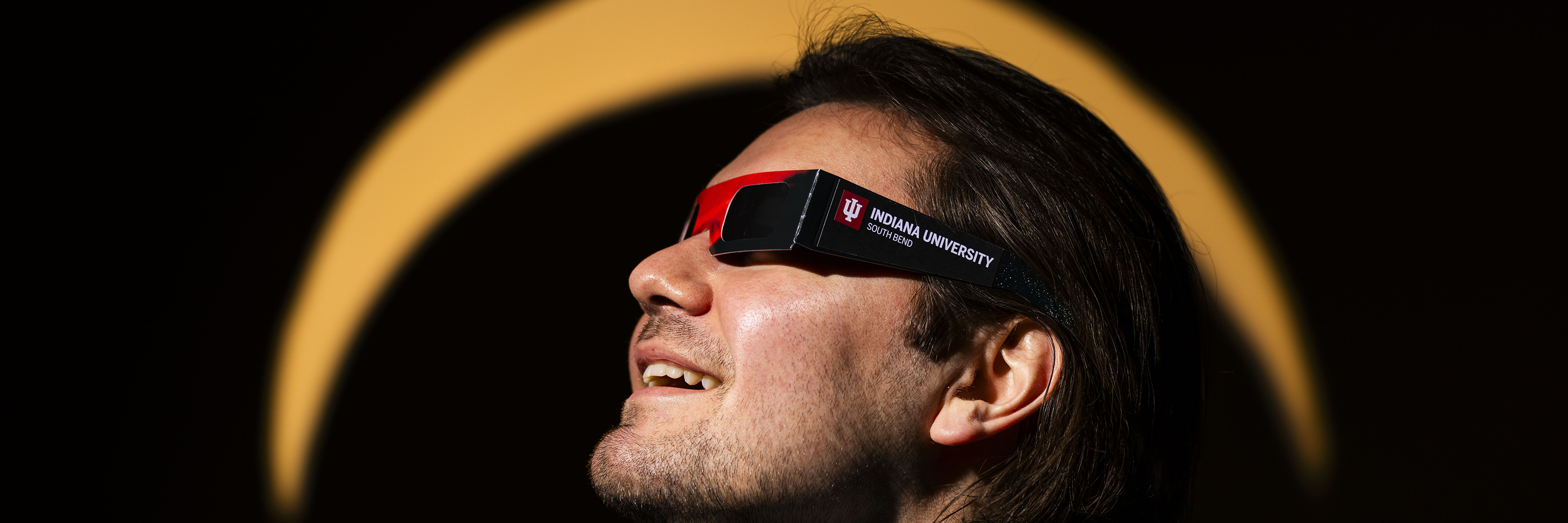The following FAQ addresses key questions about the 2024 total solar eclipse and its impact on several Indiana University campuses.
Q: What is a total solar eclipse?
A: A total solar eclipse happens when the moon passes in front of the sun and completely blocks our view of the sun. Any given spot on Earth, on average, will see a total eclipse about once every 375 years.
Q: What IU campuses will be in the path of totality?
A: Five IU campuses will fall in the path of totality on April 8, 2024, with IU Bloomington landing closest to the path’s center line.
In Bloomington, totality will last four minutes and three seconds, starting at approximately 3:05 p.m. At three other IU campuses — IU Indianapolis, IUPUC and IU East — totality will last slightly under four minutes, starting at approximately 3:06 p.m. in Indianapolis and Columbus and 3:08 p.m. in Richmond. At IU Kokomo, which falls near the northernmost edge of the path of totality, the total eclipse will last less than a minute, starting slightly after 3:08 p.m.
Q: What will those who are in the path of totality during the eclipse experience?
A: It will get dark during totality, and the five brightest planets — Mercury, Jupiter, Saturn, Venus and Mars — may be visible. If the weather is cloudy, people will experience total darkness but won’t be able to see the sun or the planets or the stars in the sky.
Q: How can I safely view the total solar eclipse?
A: Never look directly at a partial phase of the eclipse without proper eye protection. The best way to protect your eyes is to either view the eclipse indirectly using a pinhole projector, or to view it directly with an eclipse viewer. However, once the sun is completely covered by the moon, people can set aside their eclipse glasses and enjoy the view.
People who plan to use binoculars or telescopes during totality should set a timer so they know when to stop using those devices before the sun reappears.
Q: Where can I get eclipse glasses?
A: Many local libraries or science centers offer eclipse glasses. You can also order glasses online, but there are fake viewers being sold. To ensure glasses are legitimate, order from one of the American Astronomical Society's endorsed suppliers of safe solar viewers and filters.
While IU will distribute a limited number of eclipse glasses across its campuses during eclipse events, you should try to secure eye protection ahead of April 8.
Q: Will IU campuses be planning events around the 2024 eclipse?
A: IU’s campuses are planning a wide variety of educational and entertainment events leading up to and during the April 8, 2024 eclipse. Find more information on the events page.
Q: How should I prepare for the eclipse?
A: Communities in the path of totality are expected to see a large population increase as visitors come to town to view the eclipse. Bloomington alone is expected to see a population increase of around 300,000 to 400,000 people. Safety agencies are expecting an increased number of calls to 911 dispatch centers and strains on cellular networks and Wi-Fi infrastructures.
To avoid taxing already-stretched public safety resources, those planning to travel to view the eclipse should plan for extra travel time to and from eclipse events. Make sure you have a full gas tank or fully charged electric vehicle and plan a route with fuel or charging stations along the way. You should also travel with snacks, prescription medications and an emergency kit in your vehicle.
Q: What should I do if I experience an emergency during the total solar eclipse?
A: If you or someone else is in immediate danger, call 911. Additional emergency contacts for each IU campus are available online.
For non-emergency assistance, IU Public Safety will have first-aid and information stations on IU Bloomington’s campus at Lauren Robel Plaza, Briscoe Quad and Wells Library the day of the eclipse.
It’s important to prepare for the eclipse by ensuring you have plenty of snacks, prescription medications and an emergency kit handy on April 8.
Q: Is IU holding classes on April 8?
A: All in-person classes are canceled April 8 on IU campuses.
Q: Should IU staff travel to campuses in the path of totality for work on April 8?
A: Campus leadership, Human Resources representatives, and supervisors are assisting in helping prepare staff for disruptions while ensuring they continue to support important campus functions alongside eclipse-related events. Guidance is available on the IU Human Resources website.

